



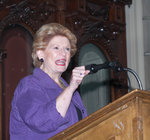
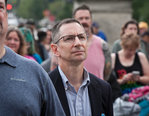



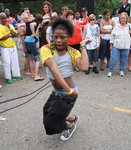

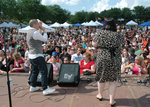
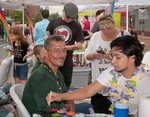
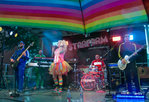
As Roxanne Frith recalls it, she “just sort of ebbed and flowed into it.”
The “it” is Michigan Pride, for which she served as official photographer for 10 years or so, starting as a volunteer in 2007 or 2008 because “they needed a photographer.”
“Then they liked the images enough that they hired me for the next nine years.”
As the official photog, Frith captured the end of the golden era of Michigan Pride, once a jampacked weekend of activities. It started on Friday nights with a comedy show, then later a white party; Saturday was the march to the Capitol, the rally on the steps, and then the festival; and for a few years, folks headed to Potter Park for a picnic on Sundays.
Michiganders came from around the state, but attendance diminished as other cities and towns introduced their own pride events. And any given year, there could also be Chicago Pride to compete with.
But a mainstay was always Frith, always on the move, always aiming her lens at the action.
And in this issue of City Pulse, we celebrate a decade of Michigan Pride through her images on pages throughout the rest of this section, broken into the three main events: the march, the rally and the festival. Frith has written the captions for all of her photos.
But first a little more about the photographer.
“I’ve had a camera since I was 7,” Frith, 64, recalled. As a teenager in her hometown of Nashville, about 40 miles southwest of Lansing, she took pictures for the local newspaper — “not really paid, more for the thrill of seeing my name in the paper.” At 16, she started attending Lansing Community College, “to learn a trade, basically,” adding that “journalism was really the only thing I knew about photography at that point.”
She learned more as an international student at 18 in Chile, where the dictator Augusto Pinochet was president.
“I was photographing a parade and there was military stuff in it, and the next thing I knew there were guns pointed at me and the film stripped out of the camera. No one had told me I couldn’t photograph military stuff.”
She got off easy because she was a student. “They just took the film and told me to never do it again.”
But she also learned that journalists had died covering the brutal Pinochet, including Americans. “That politicized my camera,” she said.
Returning to the United States, Frith earned an associate’s degree in photography at LCC, where a teacher, Joe Lippincott, encouraged her to pursue a bachelor’s. She enrolled at the University of Arizona, home of the Center for Creative Photography, which famed photographer Ansel Adams had founded and built one of the world’s largest photo collections. Among them were the works of Frith’s “photo hero,” W. Eugene Smith — known for his work for Life, a weekly magazine that combined photos and storytelling into one of the nation’s most popular publications in the mid-20th century.
Armed with her B.A. in the history of photography, she returned from Tucson to teaching at LCC while also earning a master’s degree in fine arts at the University of Michigan in Ann Arbor, where she also taught.
Frith also was part of the circle of creatives in the 1970s and early ’80s who helped turn the north end of Lansing into today’s Old Town, among them Barb Morris and the late Robert Busby, remembered as Old Town’s unofficial mayor. She and others were active in getting Old Town’s first gallery opened.
At times, health issues have limited Frith’s artistic activities. She overcame a serious heart issue and had brain surgery for an aneurysm, and community members rallied to her support when she needed a kidney transplant — but she professes to feeling fine today. Semi-retired, she teaches at the College for Creative Studies in Detroit and does commercial work for the Wharton Center.
With her old employer only hosting a rally at the Capitol this year, Frith said she understands the “devolution” of Michigan Pride because of the movement’s civil rights successes, but she fears it may be shortsighted.
“The language around Roe v. Wade puts every social gain at risk,” she cautioned.
Support City Pulse - Donate Today!
Comments
No comments on this item Please log in to comment by clicking here